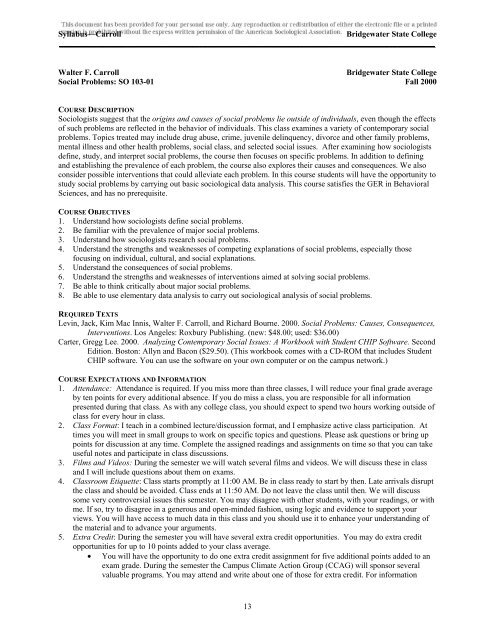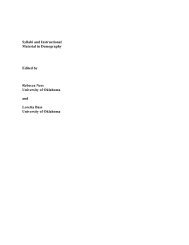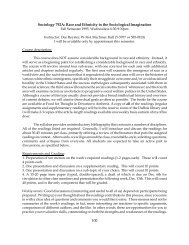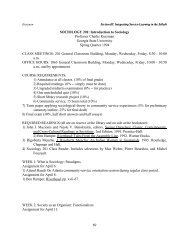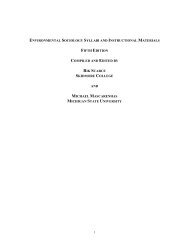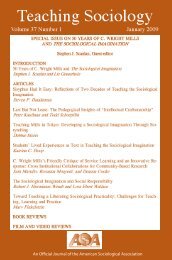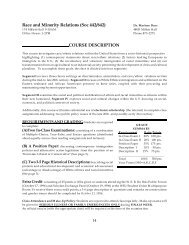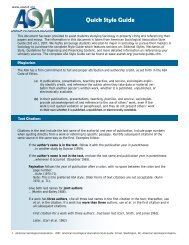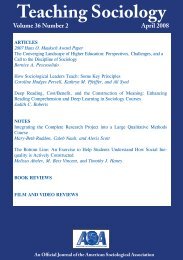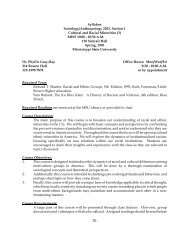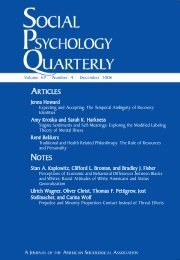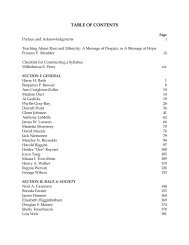Social Problems - American Sociological Association
Social Problems - American Sociological Association
Social Problems - American Sociological Association
Create successful ePaper yourself
Turn your PDF publications into a flip-book with our unique Google optimized e-Paper software.
Syllabus—Carroll Bridgewater State College<br />
_____________________________________________________________________________________________<br />
Walter F. Carroll Bridgewater State College<br />
<strong>Social</strong> <strong>Problems</strong>: SO 103-01 Fall 2000<br />
COURSE DESCRIPTION<br />
Sociologists suggest that the origins and causes of social problems lie outside of individuals, even though the effects<br />
of such problems are reflected in the behavior of individuals. This class examines a variety of contemporary social<br />
problems. Topics treated may include drug abuse, crime, juvenile delinquency, divorce and other family problems,<br />
mental illness and other health problems, social class, and selected social issues. After examining how sociologists<br />
define, study, and interpret social problems, the course then focuses on specific problems. In addition to defining<br />
and establishing the prevalence of each problem, the course also explores their causes and consequences. We also<br />
consider possible interventions that could alleviate each problem. In this course students will have the opportunity to<br />
study social problems by carrying out basic sociological data analysis. This course satisfies the GER in Behavioral<br />
Sciences, and has no prerequisite.<br />
COURSE OBJECTIVES<br />
1. Understand how sociologists define social problems.<br />
2. Be familiar with the prevalence of major social problems.<br />
3. Understand how sociologists research social problems.<br />
4. Understand the strengths and weaknesses of competing explanations of social problems, especially those<br />
focusing on individual, cultural, and social explanations.<br />
5. Understand the consequences of social problems.<br />
6. Understand the strengths and weaknesses of interventions aimed at solving social problems.<br />
7. Be able to think critically about major social problems.<br />
8. Be able to use elementary data analysis to carry out sociological analysis of social problems.<br />
REQUIRED TEXTS<br />
Levin, Jack, Kim Mac Innis, Walter F. Carroll, and Richard Bourne. 2000. <strong>Social</strong> <strong>Problems</strong>: Causes, Consequences,<br />
Interventions. Los Angeles: Roxbury Publishing. (new: $48.00; used: $36.00)<br />
Carter, Gregg Lee. 2000. Analyzing Contemporary <strong>Social</strong> Issues: A Workbook with Student CHIP Software. Second<br />
Edition. Boston: Allyn and Bacon ($29.50). (This workbook comes with a CD-ROM that includes Student<br />
CHIP software. You can use the software on your own computer or on the campus network.)<br />
COURSE EXPECTATIONS AND INFORMATION<br />
1. Attendance: Attendance is required. If you miss more than three classes, I will reduce your final grade average<br />
by ten points for every additional absence. If you do miss a class, you are responsible for all information<br />
presented during that class. As with any college class, you should expect to spend two hours working outside of<br />
class for every hour in class.<br />
2. Class Format: I teach in a combined lecture/discussion format, and I emphasize active class participation. At<br />
times you will meet in small groups to work on specific topics and questions. Please ask questions or bring up<br />
points for discussion at any time. Complete the assigned readings and assignments on time so that you can take<br />
useful notes and participate in class discussions.<br />
3. Films and Videos: During the semester we will watch several films and videos. We will discuss these in class<br />
and I will include questions about them on exams.<br />
4. Classroom Etiquette: Class starts promptly at 11:00 AM. Be in class ready to start by then. Late arrivals disrupt<br />
the class and should be avoided. Class ends at 11:50 AM. Do not leave the class until then. We will discuss<br />
some very controversial issues this semester. You may disagree with other students, with your readings, or with<br />
me. If so, try to disagree in a generous and open-minded fashion, using logic and evidence to support your<br />
views. You will have access to much data in this class and you should use it to enhance your understanding of<br />
the material and to advance your arguments.<br />
5. Extra Credit: During the semester you will have several extra credit opportunities. You may do extra credit<br />
opportunities for up to 10 points added to your class average.<br />
• You will have the opportunity to do one extra credit assignment for five additional points added to an<br />
exam grade. During the semester the Campus Climate Action Group (CCAG) will sponsor several<br />
valuable programs. You may attend and write about one of those for extra credit. For information<br />
13


